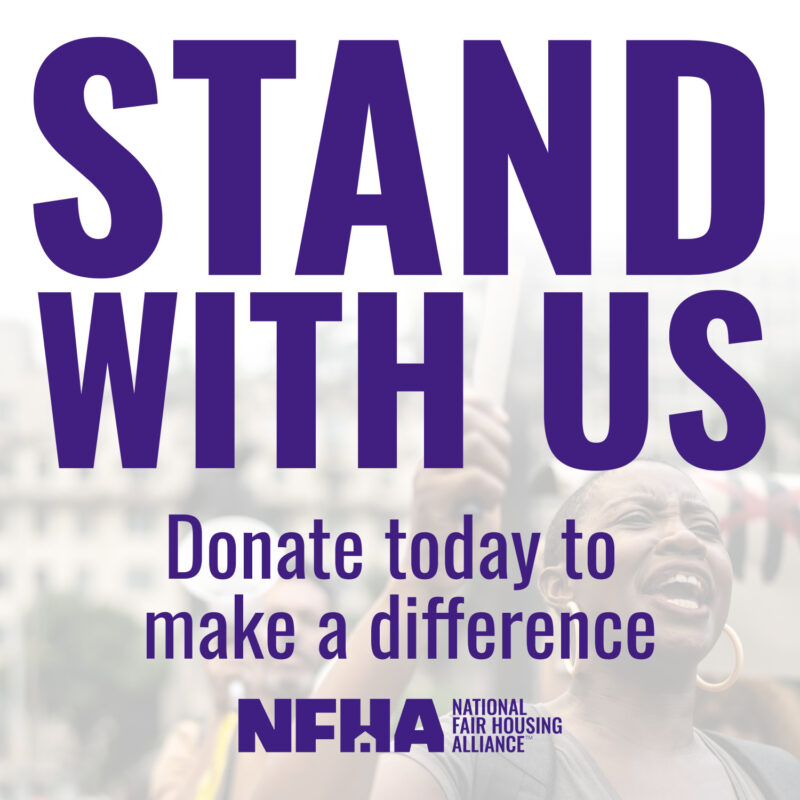New Report Makes “The Case for Fair Housing” as Segregation Persists & Hate Crimes Rise
April 19, 2017
Contact: Jessica Aiwuyor, 202‐898‐1661, jaiwuyor@nationalfairhousing.org
New Report Makes “The Case for Fair Housing” as Segregation Persists & Hate Crimes Rise
The National Fair Housing Alliance releases its annual Fair Housing Trends Report, documenting continued patterns of discrimination and segregation and highlighting fair housing trends in 2016.
Washington, DC – Today the National Fair Housing Alliance (NFHA) released its 2017 Fair Housing Trends Report: The Case for Fair Housing. Every year, NFHA collects data on housing discrimination complaints and reports on key housing issues across the U.S. in the prior year. But the 2017 report is more expansive, given an increased need to bring attention to the importance of the Fair Housing Act and the work that remains to be done to advance housing equity.
“We are one year away from commemorating the 50th Anniversary of the Fair Housing Act which was passed just seven days after the assassination of Dr. Martin Luther King, Jr. in April, 1968. Some advances have been made in opening up neighborhoods to everyone; however, people of color, persons with disabilities and other marginalized groups continue to be unlawfully shut out of many neighborhoods that provide quality schools and health care, fresh food, employment opportunities, quality and affordable credit, small business investment, and other opportunities that affect life outcomes. That is why we felt compelled to make the Case for Fair Housing in this comprehensive report,” said Shanna Smith, President and CEO of NFHA.
The 2017 Trends Report includes 2016 discrimination complaint data compiled from private, nonprofit fair housing organizations, as well as federal and state governmental entities responsible for enforcing the Fair Housing Act. It chronicles the development of residential segregation in the U.S., which was primarily a 20th century construct that unfolded in the aftermath of the abolition of slavery but the foundation of which is evidenced to this day. The facts clearly demonstrate that segregation resulted from deliberate discriminatory policies and practices by the federal government, the housing industry, and local communities. The Trends Report also presents information about the adverse costs of segregation to individuals, communities, and the nation.
Key facts from the report:
- There were 28,181 complaints of housing discrimination in 2016.
- Discrimination based on disability accounted for 55 percent of all complaints.
- Race-based housing discrimination accounted for nearly 20 percent of housing discrimination complaints.
- Only a fraction of racial, ethnic, and religious discrimination in housing is reported, because research shows most people do not report suspected discriminatory treatment.
- It is estimated that more than four million instances of housing discrimination occur annually.
Notable in 2016 was an increase in housing-related hate activity. Since the fall of 2016, there has been an uptick of hate crimes involving people who were harassed in their neighborhoods or at their apartments, university dormitories, or homes. “These instances are sometimes reported to local law enforcement but should also be reported to local fair housing centers and NFHA, because we will push to ensure that people who harass or intimidate are held accountable for violating the Fair Housing Act,” said Ms. Smith.
The Trends Report also highlights the emerging battle to combat fair housing violations on shared housing and social media platforms. Companies like Airbnb and Facebook have proactively made changes to their sites in an effort to comply with fair housing laws, but there are continued concerns about the potential for discrimination on similar platforms. Facebook worked with NFHA and other leading civil rights organizations in an effort to prevent individuals from utilizing its platform to place discriminatory ads.
The report documents that 70 percent of housing discrimination claims are handled by local, private fair housing centers. There is an increased need for HUD and other governmental agencies to expediently process cases and aggressively enforce the Fair Housing Act. There is also a need for increased support of fair housing initiatives by the philanthropic community.
Finally, the report includes key recommendations for eliminating housing discrimination, strengthening fair housing enforcement, and expanding access to opportunity.
View the 2017 Fair Housing Trends Report here.
About the National Fair Housing Alliance
Founded in 1988, NFHA is a consortium of more than 220 private, nonprofit fair housing organizations, state and local civil rights agencies, and individuals from throughout the United States. Headquartered in Washington, D.C., NFHA works to eliminate housing discrimination and ensure equal housing opportunity for all people through leadership, education, outreach, membership services, public policy initiatives, community development, advocacy, and enforcement.
